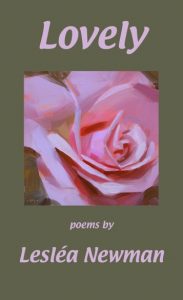

Review by Grace Gardiner
It might be expected to begin a review of Lesléa Newman’s newest poetry collection Lovely by saying that the poems that comprise this collection are themselves lovely, but this collection seems a poignant, playful, and earnest place to explore the tender truism Charles Simic once wrote in an inscription to Mark Strand, that “the dream of every honest cliché is to enter a great poem.” Indeed, poem after great poem, Newman, author of over 70 books of poetry, prose, and children’s literature, realizes in Lovely this dream of many honest clichés. The biggest and brightest of these is, of course, that four-lettered abstract noun from which the adjective lovely derives, but also the unrelenting passage of time, as well as the various consequences of such an adamant, and sometimes violent, forward-motion: hurt, growth, separation, peace, trauma, healing, and death. Nonetheless, overall it’s the soft and tough honesty of Lovely that gives the collection its loveliness and that imbues its painful and passionate moments alike with “that wild blue interlude” of light that both closes day and opens night (4).
Lovely unfolds across five sections in a loose chronological arc that details the life experiences of the collection’s prominent first-person speaker—first from a childhood of extremely traumatic and cruel moments both experienced and inflicted by this speaker in the section “Flying Toward Home,” all the way to this speaker’s unabashedly erotic and joyfully queer love for “[her]beloved” in the final section “Nasty Women.” I mention these two sections in particular because it seems that Newman purposefully traces her speaker’s trauma and healing between two poems that appear in these opening and closing pages of the collection.
The first of these two poems, “Home Safe,” concerns quite viscerally a childhood sexual assault that occurred while the present-day speaker’s child-self “was flying towards home / base which was Mrs. Barricolli’s back yard” during a game with other children from her neighborhood—“both the chasers and the chased” (5). The second poem, “Ghazal For My Beloved,” while detailing various scenes of the speaker and her beloved’s courtship, refers to an environment similar to that of the earlier poem’s sexual assault:
Remember that night long ago in the park,
When the moon watched us go to first base, my beloved?
I’ll run like the young girl I was long ago,
If you promise that you will give chase, my beloved. (84)
I don’t draw this connection between the speaker’s past sexual assault and present sexual pleasure to conflate the experiences and thereby taint the erotic with the traumatic. Instead, I mean to accentuate the similarities of environment—and of language, too—to illustrate how Newman’s honesty unsettlingly weaves Lovely and the varied, irreconcilable experiences detailed throughout its pages together, through a changing and recuperating light.
Moreover, this honest motion of experience develops further in the collection through Newman’s use of rhyme and received form, including the sonnet, sestina, triolet, and villanelle. Though form and rhyme are often considered to illustrate a poem’s rigid exactness, my experience of Newman’s rigorous sonic work overall gave the impression of the pulse and pull of a progressing repetition, a cycle that isn’t doomed, but opening. Here I return to “Home Safe.” Throughout the poem, the present-day speaker tenderly (re)calls her former self as “Little Girl Blue” and investigates through refraining and reframing questions how her assault came to pass:
Little Girl Blue
What happened to you?
Who was it? Who?
And what did he do?
. . . . . . . . . . . . . .
Little Girl Blue,
Who was it? Who?
. . . . . . . . . . . . . . .
Little Girl Blue
What did you do? (4-7)
At first, the repetition of these questions seem implemented to guide the speaker in untangling the blame and shame of her past only; however, the final iteration of this refrain reconfigures both speaker and poem’s understanding of this harmful abuse:
Little Boy Blue,
What happened to you?
Who was it? Who?
And what did they do? (8)
Yet how can this recognition of cyclical trauma ultimately be lovely? How can a collection with this harrowing and heart-rending refrain, as well as others, retain and uplift its loveliness throughout? The word that centers this collection is perhaps literally love, but also honesty, how Newman uses each sentiment to transform and encompass the other. For when weaved in precise rhythm, as happens throughout the poems in Lovely, the two sentiments don’t just blend. They hold. They knead.
Lovely
by Lesléa Newman
Headmistress Press (2018), $15 [paper]
ISBN 9780998761046
108 pp
Grace Gardiner received her MFA in Writing from The University of North Carolina at Greensboro and is a former poetry editor for The Greensboro Review and intern for Persea Books. She’s studying for her PhD in Creative Writing at the University of Missouri, Columbia.
